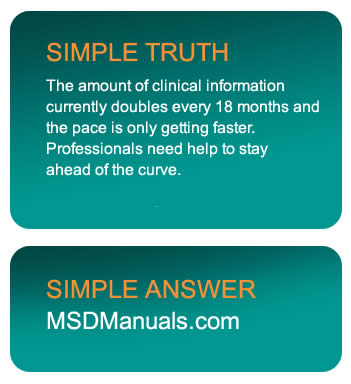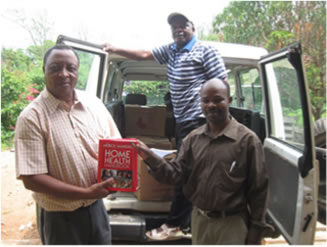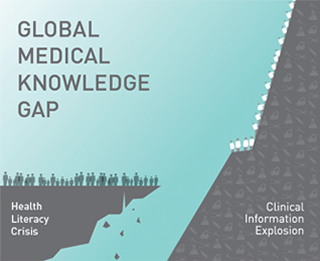Overview of the MSD Manuals
Content last modified Aug 2023
First published in 1899 as a small reference book for physicians and pharmacists, the Manual grew in size and scope to become one of the most widely used comprehensive medical resources for professionals and consumers. As the Manual evolved, it continually expanded the reach and depth of its offerings to reflect the mission of providing the best medical information of the day to a wide cross-section of users, including medical professionals and students, veterinarians and veterinary students, and consumers.
Mission Statement
We believe that health information is a universal right and that every person is entitled to accurate, accessible and usable medical information. And we believe that we have a responsibility to protect, preserve and share the best current medical information to enable more informed decisions, enhance relationships between patients and professionals, and improve health care outcomes around the world.
Fulfilling the Mission

Books for Africa

The Manuals team has donated more than 200,000 copies of the MSD Manual professional and home editions through partnerships and organizations, such as Books for Africa, for distribution to physicians, nurses and community health workers throughout developing countries.
As a sign of its deepened commitment to worldwide medical information access and improving global health, we are making the Manuals available for free in digital form to professionals and patients.
We have maintained a strong outreach to developing countries for decades. Through partnerships with organizations such as Books for Africa, we have donated more than 200,000 copies of the Manuals professional and home editions to nongovernmental organizations (NGOs) for distribution to physicians, nurses and community health workers throughout developing countries.
In 2015, we embarked on our most far-reaching medical knowledge initiative to date, Global Medical Knowledge. Through this worldwide project, the Manuals aim to make the best current medical information accessible by up to 3 billion health care professionals and patients around the world. As part of this project, all translations of the Manuals will be available online and kept current.
Editorial Independence
The Manuals are the product of a collaboration between hundreds of medical experts worldwide, an independent editorial board of peer reviewers, and our editorial staff of physicians and professional medical writers. For over 100 years, we have had complete editorial independence to present the best current thinking regarding medical diagnosis and treatment, and do not in any way promote or publicize our pharmaceutical products. To ensure absence of commercial or corporate bias, authors and peer reviewers cannot be employees of Merck & Co., Inc., Rahway, NJ, USA (MSD) nor can they serve as speakers for our pharmaceutical products, or in any other way represent the company. Although the editorial staff is employed by Merck & Co., Inc., Rahway, NJ, USA (MSD) there is no control, review, or even input into the content of The Manuals allowed from any other part of our company, including research and development, sales and marketing, public relations, legal, and corporate management.
Credibility
Many criteria have been put forth for what makes a website a credible reference source, and this issue has been much discussed in print and online1,2,3,4. Thus, the Manual has drawn on existing consensus criteria to create an easy-to-remember reminder that people looking for online health information should see where the website STANDS.

Two decades of research have documented a growing medical knowledge crisis that negatively impacts people's ability to make informed health care decisions, hinders the relationships between patients and professionals and creates a barrier to better health care outcomes in the US and around the world.
Source: Does the resource cite recognized authorities and provide their credentials?
Transparency: Is it open and obvious whether the site’s mission is educational or commercial?
Accessibility: Is the site available without registration and is there a way for users to contact someone with questions or concerns?
Neutrality: Is the information available purely as a resource, or does the site benefit financially from what its users do (such as buying products or visiting advertised websites)?
Documentation: Is the site updated when needed by recognized medical experts?
Security: Can users access content without forfeiting personal information?
The Manual will do its best to STAND by these criteria. Our over 300 authors are all recognized experts in their field. Their name and credentials are listed on each of their topics and on a contributor page, and they all endeavor to update their topics on a regular basis. Our absence of registration fees, ads, or product sales or promotion of any sort, as well as our editorial process that uses external authors and reviewers make it clear that The Manuals’ Mission Statement is truthful and that our mission is solely to be an